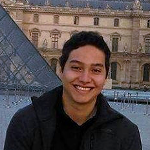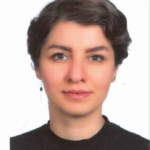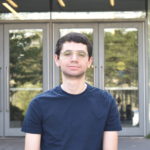DITA STUDENTS & POSTDOCS
Postdoctoral Fellow:

Zakeya Namrud - PDF, York University
Mentor: Prof. Marin Litoiu
 Ghadeer Abuoda - PDF, York University
Ghadeer Abuoda - PDF, York University
Mentor: Prof. Marin Litoiu
PhD Students:

Marjan FatehiJananloo - PhD StudentRyerson University
Mentor: Prof. Jennifer McArthur

Komal Sarda - PhD Student, York University
Mentor: Prof. Marin Litoiu

Felipe Rivera - PhD, University of Victoria
Mentor: Prof. Hausi Muller
Felipe is a PhD student and a research and teaching assistant at University of Victoria. He holds a Master’s degree (M.Sc.) in Informatics and Telecommunications and a Bachelor's (B.Eng.) in Software Systems Engineering. His research interests include (but are not limited to): Digital Twins, Models at Run-time, Model-Driven Engineering (MDE), Model-Driven Architecture (MDA), and Software Engineering at Run-Time.
Project Title: Model Evolution Management for Digital Twins Systems
Project Description: Creating model-based abstractions has enabled engineers to tame complexity when understanding, conceptualizing, and specifying systems that describe and manage real-world entities and scenarios. However, a new arising era of complex and interconnected real-time systems, such as Digital Twins (DT), imposes new challenges to systems modelling. DT-based systems demand considering both the structural elements and dynamics of physical entities throughout their entire lifecycle. DT represents a significant step forward towards the achievement of integrated data, multidimensional cooperative systems, and digitalization of a product's conception, design, development, distribution, operation, maintenance, and evolution. Although in the past DT has been halted by technological limitations, recent research and advances in data collection, storing, processing, and analysis motivate its complete realization. We investigate the application of IoT capabilities, and self-adaptive and adaptive control mechanisms to engineer smart systems based on the concept of DT. We research the challenges of data aggregation, interoperability, and representation fidelity related to the creation and management of virtual abstractions from real-world entities, with case studies in the healthcare domain.
 Miguel Jimenez: PhD, University of Victoria
Miguel Jimenez: PhD, University of Victoria
Mentor: Prof. Hausi Muller
Miguel is a PhD candidate at the University of Victoria under supervision of Drs. Hausi Müller and Gabriel Tamura. He has experience in full-stack web development and cloud computing. His area of research is Software Engineering with a focus on the design and development of architectures and infrastructures for self-adaptive systems. Funded by NSERC and IBM, Miguel's current research project focuses on automated software evolution of cloud software applications through quality-driven continuous experimentation. Miguel holds a Bachelor degree in Systems Engineering (2014) and a Master of Science degree in Informatics and Telecommunications (2016) from Universidad Icesi (Colombia).
Project Title: Continuous Software Evolution at Run-time
Project Description: The continuous evolution of systems under highly dynamic environments is the only guarantee for a reliable—and continuous—operation. As contextual changes are uncertain and, in most cases, unforeseeable at design time, traditional software engineering (SE) techniques are insufficient to ensure the continuous satisfaction of service quality. We propose the systematic and automated application of SE methods at run-time with the purpose of contributing to practical software evolution methods at run-time. We envision the application of adaptive mechanisms and techniques towards the progress of all phases in the SE process. Our research explores the concept of quality-driven adaptive experiments that are planned and executed autonomously (i.e., by an autonomic manager) to ensure service quality satisfaction. Quality-driven adaptive experiments test whether the application of software patterns improves the metrics associated with run-time quality attributes.
 Mahsa Hadian : PhD, Polytechnique de Montreal
Mahsa Hadian : PhD, Polytechnique de Montreal
Mentor: Prof. Marios Fokaefs
Mahsa is a PhD student and teaching assistant at Polytechnique University of Montreal. Her research interests include Internet of Things, cloud computing and edge computing and she is currently working at the interface of these technologies. Her Project focuses on how to reduce energy consumption on smart campuses through different clustering algorithms.
Project Title: Internet-of-Things solutions for Smart Campuses: A comparative study of clustering techniques.
Project Description: Nowadays, Internet-of-Things solutions for Smart Buildings, such as instrumentation of buildings with sensors and digitally controlled equipment, are on the rise and recent advancements in relevant technologies have enabled such applications. The benefits of such technologies have become immediately apparent with the reduction in the cost and energy consumptions and the increase of comfort and productivity for residents and personnel in such buildings. The proposed research aims to explore software solutions for the management of Smart Buildings with the goal of optimizing energy consumption and costs associated with both sensing and controlling equipment as well as computation infrastructure, with respect to the performance of data analytics. More specifically, this project focuses on managing Smart Campuses, such as universities and hospitals, which inherently increases the complexity of the problem. The main question is to find techniques for coordinating these different buildings to optimize energy consumption and to increase the capabilities of the entire campuses. For this purpose, adaptive clustering is employed to distribute and organize data analytics for the campus. This, in conjunction with concepts from Edge computing and Hierarchical clouds, helps to present a comparative study of different clustering algorithms to find optimal one across different quality indices concerning the management of Smart Buildings.
Master's Students

Juan Giraldo - M.Sc., University of Victoria
Mentor: Prof. Hausi Muller

Jose Ossorio - M.Sc., University of Victoria
Mentor: Prof. Hausi Muller

Sarah Fehresti - M.Sc., York University
Mentor: Prof. Marin Litoiu

Neda Adimi - Master's, Ryerson University
Mentor: Prof. Jennifer McArthur

Atieh Armin - Master's, York University
Mentor: Prof. Sotirios Liaskos

Mo Adel Abdelghany - MSc, University of Alberta
Mentor: Prof. Eleni Stroulia

Amirhossein Nadiri - MSc, York University
Mentor: Prof. Manos Papagelis

Ali Faraji - MSc, York University
Mentor: Prof. Manos Papagelis

Nina Yanin - MSc, York University
Mentor: Prof. Manos Papagelis

Fares Hamouda - MSc, York University
Mentor: Prof. Marios Fokaefs

Wejdene Haouari - MSc, York University
Mentor: Prof. Marios Fokaefs

Anthony Machula - MSc, York University
Mentor: Prof. Lauren Sergio

Hamza Hussein - M.Sc., York University
Mentor: Prof. Marin Litoiu
 Jaime Dantas: MSc, Computer Science, York University
Jaime Dantas: MSc, Computer Science, York University
Mentor: Prof. Marin Litoiu
Jaime is an MASc student in the Department of Electrical Engineering and Computer Science at York University. He completed his BSc in Computer Engineering from Federal University of Rio Grande do Norte in Brazil and worked as a Senior Software Engineer for several banks and fintechs in South America. His research interests include Machine Learning, Internet of Things and Cloud Computing.
Project Title: Privacy-preserving Machine Learning Framework for Edge Computing
Project Description: The increasing growth of data from sensors embedded in gadgets and Internet of Things (IoT) devices have led to several privacy concerns in recent years. We intend to use Variational Autoencoders (VAEs) and Machine Learning models to enable hiding the private information embedded in the sensor with no impact on the inference of public attributes.
 Mahmoud Alsaeed: MSc, York University
Mahmoud Alsaeed: MSc, York University
Mentor:Prof. Manos Papagelis
Mahmoud is currently a MSc student at York University. He obtained his Bachelor's degree from York University in 2020. While in undergrad, he earned the 2019 Lassonde undergraduate research award, which provided him with the opportunity to develop Distributed In-Memory Sweep-line algorithm.
Project Title: Spatial-Temporal Recommendation System
Project Description: The advancement of GPS and sensor devices resulted in a massive collection of mobility data, commonly used in location-based services and applications. Modeling and mining these Spatial-temporal data have resulted in substantial finical gains to organizations and governments. Despite the potential applications and benefits of spatial-temporal data, research into mining this kind of data is still lacking. The majority of works done in the recommendation field are typically only concerning spatial or the temporal aspect of the mobility pattern but not both. Therefore our research is focused on developing a recommendation system that utilizes both the temporal and spatial dimensions of the data. The recommendation works by taking into account all the Point-of-Interests that the user interacts with throughout his trip. Furthermore, the functionality of the recommendation system is expanded by incorporating all the additional information about the POIs (category of the location, opening hours, reviews) into a knowledge graph.
 Gian Alix: MSc, York University
Gian Alix: MSc, York University
Mentor: Prof. Manos Papagelis
Gian is an MSc in Computer Science at the Department of Electrical Engineering and Computer Science, York University. He completed his BSc in Computer Science and Applied Mathematics also at York University. His research interests include: spatio-temporal data mining, dynamic graph mining, machine learning, and mathematical modelling.
Project Title: Deep Learning Frameworks for Measuring Similarity in Big Trajectory Data
Project Description: Mining properties from big trajectory data is at the crux of research in spatio-temporal data modelling, and thus having considerable significance in geolocation-based applications and technologies. This project intends to address the problem of trajectory similarity computation. Formally, given some trajectory t and a trajectory set T, it intends to find the trajectory t* in the given set T that is most similar to the given trajectory t. The problem is extended to finding the top k trajectories in this given set T that are most similar to the given trajectory t in our query. Several existing works have attempted to address the problem of trajectory similarity computation, alongside some drawbacks. For instance, some models suffer from high computational costs and thus do not scale well with massive datasets. Some demonstrate effectivity only in Euclidean spaces but not in the realistic spatial networks, thus can cause major accuracy issues in the overall calculation. Therefore, there is a need to construct a model that mitigates these weaknesses when measuring trajectory similarities. Particularly, an efficient, scalable deep learning model that can generalize well is desired in solving the problem at hand. The research is aiming to advance the understanding of trajectory data mining in the research community as well as benefit development of location-based technologies and applications.
 Sahand Saniee Monfared: MASc, York University
Sahand Saniee Monfared: MASc, York University
Mentor: Prof. Sotirios Liaskos
Sahand is a MASc student in Computer Engineering at the Department of Electrical Engineering and Computer Science, York University. He completed his BEng in Computer Engineering at the Sharif University of Technology with a focus on the Internet of Things (IoT). His research interests include Blockchain, Internet of Things, and Machine Learning.
Project Title: Simulation-based evaluation of blockchain protocols with a focus on IoT applications.
Project Description: The massive scale and distributed nature of Internet-of-Things (IoT) presents challenges in realizing a practical and effective security solution. Blockchain-empowered platforms and technologies have been proposed to address aspects of this challenge. A blockchain is a distributed ledger in which participants that do not fully trust each other agree on the ledger's content by running a consensus algorithm. In order to realize a practical Blockchain deployment for IoT, there is a need for a testing and evaluation platform to evaluate the performance and security of Blockchain applications and systems. However, tools for evaluating consensus designs are important for such evaluations. In our project, we will work on a discrete-event simulator that is flexible enough to evaluate different blockchain implementations. We specifically focus on Algorand which is a blockchain-based cryptocurrency platform that aims to be secure, scalable, and decentralized. The Algorand platform supports smart contract functionality, and its consensus algorithm is based on proof-of-stake principles and a Byzantine Agreement protocol. Through simulating the consensus protocol of Algorand we are hoping to be able to understand its performance and security properties and compare our findings with other efforts to empirically study the performance of the specific network.
 Reza Golipour: MSc, York University
Reza Golipour: MSc, York University
Mentor: Prof. Sotirios Liaskos
Reza is a full time MAIST student in York university under supervision of Prof. Liaskos. His research area is energy related issues in buildings, specially SBEM and applying machine learning techniques in this field.
Project Title: A review of applying reinforcement learning in smart building energy management
Project Description: Total end-user energy demand was 11,489 PJ in 2017 in Canada. The residential and commercial sector together used 25% of this total amount. Thus, decreasing the energy usage in these sectors is key to reducing the total energy demand in Canada. One of the greatest energy consumers in these fields are HVAC systems. In many cases, keeping the comfort level requires considerable amount of energy from both natural gas (NG) and electricity. Thus, optimizing the combination of comfort level and minimum energy consumption can help reaching this goal to reduce total energy consumption. To achieve that, computer modelling techniques have been widely proposed to be used in conjunction with IoT configurations for sensing and actuating optimal environmental conditions in buildings. Machine Learning (ML) techniques, specifically have increased in popularity in recent years. Such techniques allow for learning from past energy consumption data of buildings without the need for accurate thermal models or any other information about those buildings. Furthermore, in the presence of complex sensing and actuation capabilities that IoT offers, reinforcement learning (RL) has been proposed as a promising ML-based automation and optimization approach. In this presentation, after a review on the fundamentals of RL, I will describe different categories for the application of RL in the smart building energy management (SBEM). In addition, several details including algorithm, objective function and performance evaluation will be studied for each of these categories.
 Gabriele Cianfarani: MSc, York University
Gabriele Cianfarani: MSc, York University
Mentor: Prof. Natalija Vlajic

Raphael Rouf: BA, Information Technology, York University
Mentor: Prof. Marin Litoiu
Short Bio: Raphael is an undergraduate student and research assistant in the School of Information Technology at York University. He is currently completing his Bachelor of Arts (B.A. Spec. Tons.) in Information Technology. His research interests include Internet of Things , Containerization, performance Testing and Modelling.
Project Title: Performance Models for Internet of Things (IoT) Applications
Project Description: Applications may have unknown interference applications running on the same virtual machine whose effects are reflected in the performance of the end user. The project aims to build a performance model between an interference Internet of Things (IoT) application and a benchmark e-commerce application using a Layered Queueing Modelling (LQM) toll. We intend on using the Kalman Filter to minimize the inaccuracy of the performance measurements inputted into the LQM. The purpose of building this model is to analyze the effects on response time and to compare the accuracy of the results of the LQM tool with other modelling tools such as machine learning.
 Nazanin Akhtarian: MSc, York University
Nazanin Akhtarian: MSc, York University
Mentor: Prof. Marin Litoiu
Nazanin is an MSc student in the Department of Electrical Engineering and Computer Science at York University. She completed her BSc in two majors, Computer Engineering and Electrical Engineering from Amirkabir University of Technology, Iran. She worked as an IoT developer for a company in Iran. Her research interests include the Internet of Things, Cloud Computing, and Performance Modeling.

Saba Zarbaf - MSc, Computer Science, York University
Mentor: Prof. Marin Litoiu

Andrew Jaramillio - MSc, York University
Mentor: Prof. Marin Litoiu

Hoda Torabi - MSc, York University
Mentor: Prof. Marin Litoiu

Harit Ahuja - MSc, York University
Mentor: Prof. Marin Litoiu & Prof. Lauren Sergio

Ramon Diaz Ramos - MSc, University of Alberta
Mentor: Prof. Eleni Stroulia

Gbolahan Akeem Afuwape - Postdoctoral Fellow, Ryerson University
Mentor: Prof. Jennifer McArthur & Prof. Eleni Stroulia

Safayet MD Islam - Undergraduate Student, York University
Mentor: Prof. Lauren Sergio
DITA ALUMNI:
 Yar Rouf: PhD, York University
Yar Rouf: PhD, York University
Mentor: Prof. Marin Litoiu
Yar is a PhD Student with research interests in Adaptive and Autonomic Systems, Cloud Computing and Performance Modeling. He is an academic collaborator with IBM, working with one of their product team on a research project based on Hybrid Clouds and Cloud Automation with Industry-specific challenges. His project currently focuses on applying Machine Learning on Hybrid Cloud metrics to optimize auto-scaling decisions and deployments.
Project Title: AI-Enabled Auto-Scaler as a Service for Hybrid Cloud Deployments
Project Description: Elasticity is one of the main promises of cloud and aims at fast provisioning and cost and performance management. While elasticity is a relatively mature field at the application or infrastructure deployment time and is supported by deployment tools and platforms, it becomes harder to obtain at runtime. The runtime challenges include environment uncertainties, lack of tools and platforms and the variety of workloads an application or infrastructure has to contend with. This project proposes a predictive auto-scaling as a service to be used for private and public clouds. A Rule-based engine is used that links the monitoring and execution services and acts as Analysis and Planning generic services. Various AI and model transfer techniques for training are investigated to allow prediction of resource usage. Model-based and predictive solutions are explored to mitigate performance issues caused by different scenarios. The architecture, its components, the ease of use and integration and its efficiency will as well be investigated.
 Mohammadreza Rasolroveicy: PhD, Polytechnique de Montreal
Mohammadreza Rasolroveicy: PhD, Polytechnique de Montreal
Mentor: Prof. Marios Fokaefs
Mohammadreza Rasolroveicy is a PhD student with a background in the field of Fault Tolerance techniques in cloud computing, E-learning and its various advantages. As a DITA trainee, he is working to further develop his expertise in IoT security and cloud computing. His project focuses on promoting security in IoT applications by integrating Blockchain technology and examining various threats that may confront these applications. He is also investigating DevOps approaches, such as MAPEK-k, to develop automation tools for maintaining performance and reducing energy consumption when applying security frameworks to the system.
Project Title: A Framework based on DevOps approaches and Blockchain to improve Security in IoT applications
Project Description: Internet-of-Things (IoT) technologies have gained prevalence in a number of domains including Smart Vehicles, Smart Buildings, Smart Health and others. IoT applications in such domains put emphasis on security, privacy and trust, which can be characterized as sensitive issues. Blockchain technologies, which acts as an immutable and transparent public record of data secured using a P2P (peer-to-peer) network, have emerged as potential solutions to address these issues. However, Blockchain can be inefficient both in terms of time and cost due to high bandwidth overhead and delays. Our aim is to study potential and popular Blockchain platforms Such as Hyperledger Fabric, BigchainDB, Hyperledger Burrow to see if there is a single best with respect to time and computation overheads , or if there are tradeoffs between the three platforms for IoT applications and finally propose a lightweight blockchain model using DevOps approaches which could be suitable for IoT devices.
 Adam Oliphant: MSc, Ryerson University
Adam Oliphant: MSc, Ryerson University
Mentor: Prof. Jennifer McArthur
Adam is studying Building Science at Ryerson University in Toronto. His research is focusing on fault detection in building automation systems. He comes from a background in architecture and spent 3 years prior to his masters in structural steel design and fabrication. Outside of school and work, he engages in a broad range of creative vocations ranging from cooking to woodworking.
Project Title: Fault detection in smart buildings using Bayesian Networks
Project Description: The project aims to leverage machine learning, bayesian networks, and conventional data analysis techniques in order to help identify potential faults and causal relationships between faults in a smart building system equipped with numerous IoT devices and sensors. What this means practically is developing techniques to interpret live data streams from the sensor network using AI trained probability modelling software packages like GeNIe, and writing applications in python to identify potential anomalies or faults in the system as they occur.

Michael Stock: MASc, Ryerson University
Mentor: Prof. Jennifer McArthur
Michael is an intuitive and goal driven Building Science Specialist whose professional responsibilities have included field review and testing, investigation, design, and contract administration for new construction and building restoration projects. He has started his MASc in Building Science at Ryerson in September 2019 and is eagerly interested in research in the fields of construction, facilities management, and smart building technologies.
Project Title: Modelling Continuous Performance Evaluation and Fault Detection Algorithms for Air Handling Units
Project Description: Equipment faults, drifting setpoints, and wear can degrade performance and reduce efficiency. Regular physical inspection and monitoring of unit performance is rarely feasible in today’s facility management context due to the high level of effort associated with such activities. Smart Building vendors have touted the benefits of IoT devices to overcome this issue with promising results, however the cost associated with such new systems is a limitation for many building owners. This project investigates the potential to use legacy building automation systems instead, removing this cost barrier. These systems continuously capture operational data from connected equipment using sensors and are capable of trending data to support analytics through the application of machine learning. Given their ubiquity in buildings, Air Handling Units (AHUs) have been selected as a test case for such an approach. This research consists of three elements: (1) a review of common AHU faults, their root causes, and how these could be observed from the sensor data; (2) the development of an emulator to simulate the full range of normal and faulty operations for sample AHUs to create a dataset; and (3) the training of machine learning algorithms to classify equipment performance based only on typically monitored data points. The resultant algorithm will support both online fault detection and diagnosis as well as the development of weather-adjusted controls to optimize energy performance.
 Shadan Golestan: PhD, University of Alberta
Shadan Golestan: PhD, University of Alberta
Mentor: Prof. Eleni Stroulia
Shadan is studying his PhD in Computing Science at the University of Alberta. His research is in the area of Internet of Things and Data Analysis, focused on evaluating sensor deployment configurations in smart indoor spaces. He loves to play ice skating and basketball.
Project Title: Sensor Deployment Evaluation in Cyber Physical Systems
Project Description: Smart homes are indoor environments equipped with various ambient sensors, e.g., motion and pressure sensors, Bluetooth beacons, etc. The configuration and deployment of the sensors should be evaluated and tested, at an early stage, from different perspectives in order to make sure the system is capable of providing adequate information to the intended application. However, this process is largely manual, burdensome, time-consuming and error-prone. In addition, the process needs to be repeated for each different space where the sensors are deployed. In this project, we propose a methodology for faster evaluation of sensor configuration deployments for indoor spaces. In addition, we envision to transfer useful knowledge from an indoor space sensor placement evaluation to another.
 Gary Chang: MASc, Ryerson University
Gary Chang: MASc, Ryerson University
Mentor: Prof. Jennifer McArthur
Gary comes from a building engineering background, completing his B.Eng of Architectural Conservation and Sustainability Engineering (Structural Stream) at Carleton University in April 2019. He is currently studying full time in the MASc of Building Science at Ryerson University, with a keen interest in smart buildings and building optimization. Gary is currently working as a Data Scientist at H.H.Angus & Associates Ltd.
Project Title: HVAC optimization and Fault Detection in Light-Industrial Applications
Project Description: Reduction of energy and GHG emissions have become a topic of significant within building science research. Despite this, light-industrial building optimization has had limited attention, and there are tremendous saving opportunities that can be achieved within this context. This project will consist of two elements: a data acquisition and evaluation portion, leveraging IoT devices to capture system performance data from a light industrial facility, and the integration of this data with a (white-box) AHU emulator created in Matlab/Simulink. The outcome of this research will be a validated grey-box model that can be used to evaluate energy performance, inform model predictive control, and energy optimization the performance of a real HVAC system for light-industrial building.
 Kim Long Ngo: MASc, York University
Kim Long Ngo: MASc, York University
Mentor: Prof. Marin Litoiu
Kim Long is an experienced back-end software engineer. He graduated from Nanyang Technological University (Singapore) in 2014 and has worked at PayPal Pte, Ltd (Singapore) for 5.5 years. His main roles were implementing business logics in large-scale payment systems in addition to monitoring and enhancing non-functional requirements such as performance. Kim Long started his MASc in Computer Engineering at York University in September 2019, specializing in system’s performance. His thesis will focus on the performance of new software architecture – Serverless – Function as a Service.
Project Tittle: Performance Analysis for Serverless – Function as a Service
Project Description: Software architecture has evolved from Monolithic structure to Microservices architecture. This transformation advocates the modularity of software systems, bringing great improvements in software development, release and maintenance. However, Microservices architecture requires at least one server to run continuously, this may incur unnecessary cost for rare traffic services. To overcome this issue, a new architecture has been invented which is Serverless architecture – Function as a Service (FaaS). Serverless architecture allows a piece of code to be quickly deployed, serve the traffic and then end the process. This architecture has brought promising benefits for many types of application however there are still some challenges in its performance compared to traditional Microservices. This project is to identify these FaaS’ characteristics, performance challenges, advantages and disadvantages while using FaaS in modern software.

Sumona Mukhopadhyay: Postdoctoral Fellow, York University
Mentor: Prof. Marin Litoiu & Prof. Lauren Sergio
Sumona Mukhopadhyay was with the department of Electrical and Computer Engineering, University of Calgary, AB, Canada, as a postdoctoral Associate in System Identifications Lab from April 2018 – May 2019. She was an Alberta Innovates – Technology Futures (AITF) doctoral scholar and received the Ph.D. degree in electrical and computer engineering from University of Calgary in 2018. Her PhD supervisor is Prof. Henry Leung. Currently, she is a postdoctoral fellow in Adaptive Software Research Lab, York University.During her postdoctoral research, she has collaborated with various industry collaborators such as HiFi Engineering, Calgary and IBM Centre for Advanced Studies, Toronto. Her research interests include System Identification and Optimization, machine learning for dynamical systems and nonlinear dynamics.

Shadi Sadeghpour: PhD, York University
Mentor: Prof. Natalija Vlajic
Shadi is a Ph.D. candidate at Lassonde School of Engineering, York University, specializing in the areas of Computer Networking and Network Security. She obtained her BSc in the field of Computer Engineering, with a focus in hardware, and her M.Sc., specialized in 5G Network Caching, dealing with the bandwidth constraint of backhaul links in 5G Small Cell wireless network. Shadi holds an EIT license from professional Engineering Ontario.
Project Title: Clustering-Based Outlier Detection in Data Streams for Detection of Malicious Web Sessions.
Project Description: To date, machine learning (ML) algorithms have been used with a great success in a number of real-world systems and applications. However, the scientific community is becoming increasingly aware of the fact that ML algorithms, when deployed in an open environment, could easily become the target of a malicious/adversarial manipulation. The aim of this project is to deploy ML learning for the purposes of identifying and analyzing malicious sessions in the logs of a target Web-server. In particular, we are developing a system that will perform accurate detection of outlier Web sessions on a WAF-like appliance using adaptive ML with on-line active learning. The design of the system will take into account (and build defences against) potential adversarial manipulation using malicious sessions, including those generated by compromised IoT devices.
 Ali Nemati: MSc, York University
Ali Nemati: MSc, York University
Mentor: Prof. Manos Papagelis
Ali is studying M.Sc. in computer science at Lassonde School of Engineering, York University. He received his Bachelor in Computer Engineering from Sharif University of Technology. Meanwhile, he has worked and obtained technical skills by working in the IT industry for about a year. He is currently working on the trajectory data mining field.
Project Title: Trajectory Data Mining for Adaptive Traffic Signal Control
Project Description: Traffic signal control is essential for transportation efficiency in road networks. It has been a challenging problem due to the complexity of traffic dynamics. Conventional transportation research suffers from the incompetency to adapt to dynamic traffic situations. Recent studies propose to use reinforcement learning (RL) to search for more efficient traffic signal plans. Cooperation among the traffic signals enables vehicles to move through intersections more quickly. Conventional transportation approaches implement cooperation by pre-calculating the offsets between two intersections. Such pre-calculated offsets are not suitable for dynamic traffic environments. In this project, the aim is to use a reinforcement learning method for the adaptive traffic signal control that can cooperate among the traffic signals.
 Fazel Arasteh: MSc, York University
Fazel Arasteh: MSc, York University
Mentor: Prof. Manos Papagelis
Fazel is an MSc student in computer science at Lassonde School of Engineering, York University. He received his Bachelor in Computer Engineering from the Sharif University of Technology. Fazel is keenly interested in both theory and applications of reinforcement learning, and deep learning. His current work is on the applications of deep reinforcement learning in trajectory data mining.
Project Title: Reinforcement Learning for Adaptive Navigation of Autonomous Vehicles in the Road Network
Project Description: Urban traffic has been one of the most challenging problems for modern humans. The movement of the traffic in the road network is highly dynamic. As a result, optimal path planning in this highly dynamic network is a challenging task. Autonomous Vehicles (AVs) can remedy many of the urban traffic challenges. We propose a Multi-Agent Reinforcement Learning (MARL) Algorithm that can enable a fleet of AVs to not only capture the dynamics of the network but also cooperate in their path planning. An AV only knows its destination and its current road. Whenever an AV reaches an intersection the RL agent at that intersection routes it to its next road until it reaches its destination.
 Jing Li: MSc, York University
Jing Li: MSc, York University
Mentor: Prof. Manos Papagelis
Jing is an incoming Master student in Data Mining Lab at York University. Specializing in data mining and spatiotemporal networks, she has been working on Epidemic Dynamics.
Project Title: Epidemic Spreading in Trajectory Networks
Project Description: With the worldwide outbreak of COVID-19, advanced technologies have been successfully employed in monitoring and containing the epidemic based on digital contact tracing (e.g., Apple and Google Exposure Notifications). Contacts can be digitally traced through Bluetooth technology, GPS-enabled devices, WiFi and similar proximity-based communication protocols of electronic devices. Motivated by this functionality, we consider the underlying spatiotemporal network of contacts (mobility network) and develop and evaluate an agent-based SEIR model of epidemic spreading in it. Our work focuses on the effect of heterogeneity of exposure to the disease. Specifically, we assess the risk of infection of an individual based on the number of their contacts and the duration of contact. Then we simulate disease spread and examine individual-based targeted intervention. The results show that targeted interventions can significantly outperform generic (horizontal) intervention strategies. Overall, our data-driven epidemic model provides insights into the role of heterogeneity in epidemic spreading phenomena and can inform evidence-based decision-making for health policy.
 Logan Gilmour: MSc, University of Alberta
Logan Gilmour: MSc, University of Alberta
Mentor: Prof. Eleni Stroulia
Logan Gilmour is studying Computing Science at the University of Alberta. His research is in Computer Vision, focused on reconstructing 3D building plans from photos. He has cofounded a game studio and worked in VR/AR. He's also a skier, rock-climber, cyclist, and general outdoor enthusiast.
Project Title: Learning non-local features for 3D reconstruction of buildings
Project Description: 3D Building Information Modeling (BIM) is a unified way of managing not only the design and construction of a building, but the whole lifecycle, including maintenance, retrofitting, and demolition. Many existing buildings lack BIM. Traditionally, 3D models would be constructed by surveyors taking many accurate measurements followed by architectural technologists integrating those measurements into a 3D model. This is a slow and expensive process. The Structure-from-Motion (SfM) photogrammetry approach to 3D reconstruction uses many photos of a static scene to recover both camera and scene information. One of the major challenges identified in structure-from-motion reconstruction of urban environments is the lack of easily uniquely matched local point features. Convolutional Neural Networks (CNN) have recently upended the field of computer vision. I hope to design a CNN architecture learn non-local feature representation, then use those features in a reconstruction system that overcomes some of the problems inherent in urban 3D reconstruction using SfM.

Mahima Chaudhary: MASc, York University
Mentor: Prof. Marin Litoiu & Prof. Lauren Sergio
Mahima is an MASc student in Department of Electrical Engineering and Computer Science at York University. She completed her Bachelor in Electrical Engineering from India. Her research interests include Machine Learning, Internet of Things and Networks and she is currently working at the interface of these technologies.
Project Title: Using Brain Computer Interaction to control IOT devices.
Project Description: The use of non-invasive techniques like EEG to capture brain signals has been the state of the art for the past few years. This technique has been employed in various control applications. We intend to use the inference drawn from the EEG signals, like eye blink and jaw clenching, to predict the behaviour of a person, which in turn can be used to take actions in advance, like controlling IOT devices.
 Payal Goyal: MSc, MAIST, York University
Payal Goyal: MSc, MAIST, York University
Mentor: Prof. Marin Litoiu & Prof. Lauren Sergio
Payal completed her Masters in Information & Technology at York University with an undergraduate degree in Computer Science & Engineering. She is currently a Senior Consultant, Data Engineer at KPMG. Payal is a Data enthusiast offering three years of IT consulting experience with leading financial firms of America while in Infosys. She has spanned several projects throughout her career in Data Management and Data Engineering practice, ensuring essential turnarounds from business intelligence that aid clients in undertaking critical decisions. During her Master's in York University, she is also interning with a health technology company to develop an online health assessment tool for COVID-19 recovered patients to analyze any changes in their neurological functions of the brain. She is thrilled to apply the academic and industry knowledge to her research and looks forward to exploring more in the related field and incorporate her critical-thinking skills into real-world problems!
Project Title: Privacy-Preserving Edge Cloud Architecture for IoT Healthcare Systems
Project Description: With the surging demand for Internet of Things (IoT) healthcare applications, a myriad of concerns about data privacy come to light. Cloud computing inherits risks of exposing data to re-identification vulnerabilities. A secure solution is storing and processing data locally on edge, but it lacks the provision of powerful machine learning (ML) needs. An improved computing framework is required incorporating ML capabilities and user-data confidentiality. The proposed research perform a systematic study of IoT healthcare systems and demonstrate a three-tier architecture that protects data privacy and enables data sharing.
 Prashanti Priya Angara: PhD, University of Victoria
Prashanti Priya Angara: PhD, University of VictoriaMentor: Prof. Hausi Muller
Priya is a PhD student at the Rigi Lab, University of Victoria, supervised by Profs. Muller and Stege. Her interests are in the area of Artificial Intelligence and Quantum Computing. For her Master's degree, she worked with conversational agents, their frameworks and methodologies to build them. She finished her undergrad in India in the field of Computer Science and worked at Oracle Corporation prior to coming to Canada. In her free time, she does photography and plays badminton.
Project Title: Towards a deeper understanding of current conversational frameworks through the design and development of a cognitive agent
Project Description: In the exciting era of cognitive computing, conversational agents have a promising utility. They aim to offer an alternative to traditional methods for humans to engage with technology. This can mean to reduce human effort to complete a task using reasoning capabilities and by exploiting context, or allowing voice interaction when traditional methods are not available or convenient. This project investigates technologies that power conversational applications such as virtual assistants, chatbots and conversational agents to gain a deeper understanding of the frameworks used to build them. It introduces Foodie, a conversational kitchen assistant built using IBM Watson technology. Utilizing IBM Watson's conversational services, Foodie aims to assist families in improving their eating habits through recipe recommendations taking into account personal contexts, such as allergies and dietary goals while helping reduce food waste and managing grocery budgets. In the project, Foodie's contextual data is characterized and its methods of interaction with the application are defined.
 Shabnam Hoseini Mousavi: MSc, York University
Shabnam Hoseini Mousavi: MSc, York University
Mentor: Prof. Natalija Vlajic
Shabnam received her Bachelor in Computer Science from University of New Brunswick. After gaining some experience through working in a security firm - a cybersecurity startup company specializing in insider threat detection, - she developed a passion towards cybersecurity and the field of Internet of Things (IoT). She is currently working on the security of IoT devices, as an exisiting challenge in this rapidly growing field.
 Caroline Quinn: MASc, Ryerson University
Caroline Quinn: MASc, Ryerson University
Mentor: Prof. Jennifer McArthur
Caroline is an avid learner who seeks to create bridges between the built environment and technology. She completed her BSc with a major in computer science in 2016 at Mount Allison University. After graduating, she worked in IT business system projects and completed her master’s certificate in project management at the Schulich Executive Education Center. As of September 2018, Caroline has begun her MASc in Building Science at Ryerson University. Caroline is keenly interested in the study of smart buildings, and is working on her thesis studying data ontology supporting the smart and continuous commissioning of buildings.
Project Title: Data Ontology to Support Smart and Continuous Commissioning of Buildings
Project Description: To achieve Canada’s GHG reduction targets, building performance (including those older and less sophisticated) must be improved. Enabling buildings with Smart and Continuous Commissioning (SCCx) functionality will allow peak performance to be achieved at minimum cost, while reducing energy use and improving occupant health and comfort. A comprehensive literature review of existing data ontologies supporting parallel topics to SCCx, including facility management, commissioning, and energy management, has been completed. Using learned strategies and a lean-agile approach, a SCCx-specific ontology is developed and proposed. A supporting case study implements the resultant ontology in a Ryerson University building to ensure that the data model fully captures streamed data and supports a range of building applications. The ontology permits the real-time diagnosis and correction of building system faults and optimization of building performance. This ontology forms the basis for the longer- term SCCx prototype development, which will support the development of innovative approaches to improve sustainability in building operations across scale, next- generation building controls and automation strategies.
 Nahid Alimohammadi: MSc, York University
Nahid Alimohammadi: MSc, York University
Mentor: Prof. Sotirios Liaskos
Nahid has strong scholarly and entrepreneurial backgrounds in various areas of IT development; from coding with C and JAVA, and analysis and design of enterprise systems, to managing several software projects and later successfully leading them to flourishing businesses. She is currently exploring new frontiers in the research areas of IoT and Blockchain and the manner they affect our lives.
Project Title: Empirically Exploring the Scalability, Security and Sustainability of Blockchain Networks
Project Description: Blockchain technologies have attracted substantial attention both in the research and the business communities during the past few years. They provide decentralized platforms to validate different types of transactions without relying on a central authority. Since the advent of the popular Bitcoin network, lots of protocols and technologies have been offered to improve Bitcoin network’s shortcomings in the areas of scalability, security and energy efficiency. Examples are Directed Acyclic Graph (DAG), Algorand and Proof of Stake. However, validity of these proposals are usually based on theory rather than experiments. Experiments on real networks are not easy since they require controlling large networks with motivated adversaries. The goal of this thesis is to develop, test and use high-resolution Blockchain simulators to empirically compare various properties of dominant Blockchain technology proposals and assess factors that affect scalability, failure rate, exposure to security attacks, energy efficiency and decentralization.
- Joydeep Moukherjee - Postdoctoral Fellow, York University
- Sunil Kumar - MSc, Computer Science, University of Victoria
- Raj Ravichandram - MSc, Computer engineering, University of Toronto
- Yihuan Huang - MSc, Computer engineering, University of Toronto
- Seyed Pakdaman - MSc, Computer engineering, University of Toronto
- Candelario Guiterrez - MSc, Computer Science, University of Alberta
- Kalvin Eng - MSc, Computer Science, University of Alberta
DITA UNDERGRADUATE TRAINEES:
- Rishab Dhamija - BSc, Computer Security, York University
- Mashruf Chowdhury - BSc, Computer Security, York University
- Andrew Jaramillio - BSc, Computer Science, York University
- Akin Adewale - BSc, Software Engineering, York University
- Josh Sahota - BSc, Computer Security, York University
- Julian Galati - BSc, Computer Security, York University
- Kenneth Tihja - BSc, Computer Science, York University
- Jialin Sun - BSc, Computer Science, York University
- Sami Tarazi - BSc, Computer Science, York University
- Jing Li - BSc, Computer Science, York University
- Shaked Brosh - BSc, Computer Security, York University

